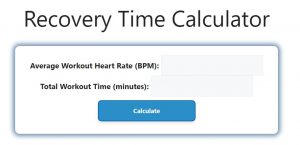About Recovery Time Calculator (Formula)
A Recovery Time Calculator is a valuable tool for athletes and fitness enthusiasts aiming to optimize their workout regimens. Recovery time is critical for muscle repair, overall performance improvement, and injury prevention. By calculating the appropriate time needed for recovery based on various factors, such as heart rate and workout intensity, individuals can make informed decisions about their training schedules. This article will outline the formula, usage, an example, and common questions related to the Recovery Time Calculator.
Formula
The formula for calculating recovery time is:
WRT = (HR × WT) / 200,
where WRT represents the workout recovery time in minutes, HR is the heart rate during exercise, and WT is the workout intensity measured in watts.
How to Use
Using the Recovery Time Calculator is straightforward:
- Measure Your Heart Rate: Determine your heart rate (HR) during your workout, ideally in beats per minute.
- Determine Workout Intensity: Calculate or estimate your workout intensity (WT) in watts.
- Input Values: Enter your heart rate and workout intensity into the calculator.
- Calculate Recovery Time: Click the calculate button to find out your required recovery time.
Example
Let’s say your heart rate during a workout was 150 beats per minute, and your workout intensity was 300 watts.
- First, input the values into the formula:
WRT = (150 × 300) / 200. - Now, calculate the recovery time:
WRT = (45,000) / 200 = 225 minutes.
This means that after this workout, you should aim for approximately 225 minutes of recovery time.

FAQs
- What is a Recovery Time Calculator?
It is a tool that helps determine the amount of time needed for recovery after exercise based on heart rate and workout intensity. - Why is recovery time important?
Adequate recovery time helps prevent injuries, allows muscles to repair, and improves overall performance. - How do I measure my heart rate?
You can measure your heart rate manually by checking your pulse or using a heart rate monitor during exercise. - What does workout intensity mean?
Workout intensity refers to how hard you are exercising, often measured in watts or as a percentage of your maximum effort. - Can I use this calculator for any type of workout?
Yes, it can be used for various workouts, including cardio, strength training, and high-intensity interval training (HIIT). - What factors can affect recovery time?
Factors include the type of exercise, intensity, duration, individual fitness level, and overall health. - How accurate is the recovery time calculated?
The accuracy depends on the precision of the heart rate and intensity values you provide. - Is there a maximum recovery time?
While there’s no strict limit, excessively long recovery periods can hinder training progress; it’s best to find a balance. - How often should I calculate my recovery time?
It’s beneficial to calculate recovery time after each significant workout to tailor your training regimen accordingly. - Can this calculator help with injury prevention?
Yes, by ensuring adequate recovery time, you can reduce the risk of overtraining and related injuries. - What if my workout intensity varies?
Use an average intensity value for varied workouts to get a general idea of recovery needs. - Is the calculator suitable for beginners?
Absolutely! It can help beginners understand the importance of recovery as they build their fitness levels. - Can nutrition impact recovery time?
Yes, proper nutrition and hydration significantly affect recovery rates; consider these factors alongside the calculator. - How can I speed up recovery?
Adequate sleep, proper nutrition, hydration, and active recovery methods can help speed up the recovery process. - What should I do during recovery time?
Light activities like walking, stretching, or yoga can aid recovery without overexerting yourself. - How does age affect recovery time?
As individuals age, recovery times may increase due to factors like slower metabolism and reduced muscle elasticity. - Can I use the calculator for endurance training?
Yes, it is beneficial for both endurance and strength training workouts to gauge necessary recovery times. - Are there any apps that can calculate recovery time?
Many fitness apps include recovery calculators based on inputted workout data and personal metrics. - What is the relationship between heart rate and recovery?
Higher heart rates during exercise generally indicate greater intensity, requiring more recovery time post-workout. - Can overtraining affect recovery time calculations?
Yes, if you’re overtraining, you may need longer recovery periods than what the calculator suggests.
Conclusion
The Recovery Time Calculator is an essential tool for optimizing workout schedules and enhancing athletic performance. By accurately calculating the time needed for recovery based on heart rate and workout intensity, individuals can tailor their training regimens to their specific needs. This understanding of recovery time plays a critical role in improving fitness levels while minimizing the risk of injuries. Regularly utilizing this calculator can help you achieve your fitness goals more effectively and sustainably.